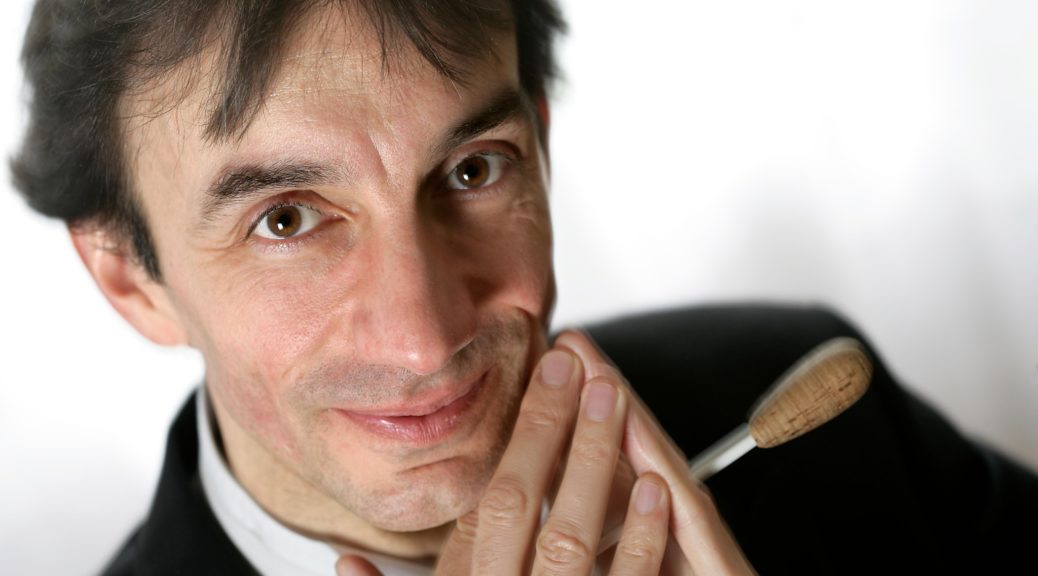
MAHLER’S SYMPHONIC FAREWELL TO US ALL
ROHNERT PARK, CA—After 12 years, the Santa Rosa Symphony is bidding au revoir, or perhaps adieu, to Music Director Bruno Ferrandis. Never one to skimp on challenges, the French conductor programmed the fiendishly difficult 81-minute Mahler Ninth Symphony—an apt adieu for the composer himself—along with a contemporary concerto.
In this go-round of the Ninth of 1910, for all but the first movement I’d give glowing reviews. The rustic country dance of the second movement went spiritedly, rowdy enough to contrast with the urbane First. This was just what was needed: No spit-and-polish metropolitan discipline, but rather dances of peasants who also thrived in the Austrian Empire back then. The irony-laced Third was trenchant; here Mahler appeared to take musical potshots at his critics, bolstered by the oh-so-solid SRS brass players.
In the finale the poetic string section brought home the composer’s poignant, ardently romantic farewell theme as it vacillated between major and minor keys. At the end, the orchestra was magnificent in carrying off one of the most nebulous closes ever, fading, fading, until nothing. This was pure Mahler, mingling joy with sadness over his prematurely declining health.
The demanding half-hour-long opening movement was less fortunate—the musicians played all the notes, but they never jelled into an ensemble effect. Happily the rest of the magnum opus was admirable (when heard May 6), showing off Meredith Brown’s glowing horn section as well as other sections too numerous to name. The performance was rewarded by the sell-out house’s prolonged ovation, for both Ferrandis and the orchestra.
The contemporary companion piece was a unique surprise: a concerto for cimbalom, a mallet instrument seemingly halfway between a zither and a harpsichord with the top removed. Its strings are struck by supple mallets producing a soft metallic sound, and it is heard mostly in gypsy orchestras in Romania, Slovakia and points between, always playing by ear, not from a score. To add to the challenge, the strings are not arranged by consecutive pitches—a nightmare for a visiting pianist.
When virtuoso Jan Mikusek sat down however at the cimbalom to do the solos of Michal Rataj’s “Temporis” (2015), he used a score. The one-movement 19-minute work calls for a large orchestra that is mostly silent, as the dulcet cimbalom cannot play forte or fortissimo. Rataj’s piece focuses on effects (unusual ones) rather than themes or melodies. While Makusek plays the mellifluous arpeggiated chords, the orchestra will retort in subdued fashion with glints of air blown through brass, or bows drawn across metallic percussion. Now and then a pre-recorded wordless voice sounds a note. The strings and winds are barely audible. After a stormy moment or two, the work reverts to the serenity of near-silence.
Mikusek, who by profession is normally a choral conductor, added the most unusual encore ever: He played a folk song “Up on the Hill” on the cimbalom and sang it, in a pleasant baritone. Mikusek, Rataj, “Temporis” and the folk song all originated in the Czech Republic—a land that also includes the Austrian Mahler’s birthplace. So, in a way, an all-Czech event.
So now Music Director Ferrandis moves on. Some chafed at his continuing to live abroad after getting this job some 70 miles north of San Francisco, unable to fulfill a community’s many musical needs apart from leading the symphony in seven sets of triple classical concerts. But he did shape and oversee a commendable and sometimes outstanding orchestra in recent years, maintaining high professional standards, while the SRS benefited greatly from the awesome acoustic environment of Weill Hall which opened during his tenure. Yes, the orchestra belongs in Santa Rosa. But to get such an enhancing acoustical environment, it’s worth their while to travel seven miles south every time to Weill, shared with the campus community of Sonoma State University.
And shortly the baton will be passed to the new maestro in town, Francesco Lecce-Chong, 30, of Italian-Chinese descent. He beat out four other finalists, all older than he. His SRS concerts begin Oct. 6 with, interesting enough, no French music at all for that 91st SRS season.
Santa Rosa Symphony in concert May 5, 6, 7, Bruno Ferrandis conducting, with music of Mahler and Rataj. Weill Hall, Sonoma State Univ., Rohnert Park, CA. For SRS info: (707) 546-8742, or go online.